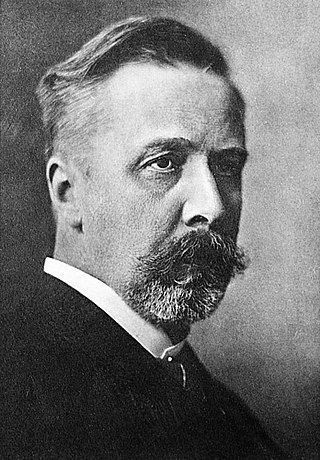Related Research Articles

The Max Planck Society for the Advancement of Science is a formally independent non-governmental and non-profit association of German research institutes. Founded in 1911 as the Kaiser Wilhelm Society, it was renamed to the Max Planck Society in 1948 in honor of its former president, theoretical physicist Max Planck. The society is funded by the federal and state governments of Germany.

The Kaiser Wilhelm Society for the Advancement of Science was a German scientific institution established in the German Empire in 1911. Its functions were taken over by the Max Planck Society. The Kaiser Wilhelm Society was an umbrella organisation for many institutes, testing stations, and research units created under its authority.

Marbach am Neckar is a town about 20 kilometres north of Stuttgart. It belongs to the district of Ludwigsburg, the Stuttgart region and the European metropolitan region of Stuttgart. Marbach is known as the birthplace of Friedrich Schiller, to whom it owes the additional designation of Schiller City, which it has officially held since 2022.[2] The town is home to the Schiller National Museum, the German Literature Archive and the Modern Literature Museum.

Friedrich Griese was a German novelist. He was associated with the nationalist literary movement during the Third Reich.

The Gottfried Wilhelm Leibniz Prize, or Leibniz Prize, is awarded by the German Research Foundation to "exceptional scientists and academics for their outstanding achievements in the field of research". Since 1986, up to ten prizes have been awarded annually to individuals or research groups working at a research institution in Germany or at a German research institution abroad. It is considered the most important research award in Germany.
Professor Drago Kolar (1932–2000) was a head of the Ceramics Department at the Jozef Stefan Institute from 1965 until 1997.

The Max-Planck-Institut für Eisenforschung GmbH (MPIE) is a research institute of the Max Planck Society located in Düsseldorf. Since 1971 it is legally independent and organized in the form of a GmbH, owned and financed equally by the Max Planck Society and the Steel Institute VDEh. It conducts basic research on advanced materials, specifically steels and related metallic alloys.

Gerhard Ertl is a German physicist and a Professor emeritus at the Department of Physical Chemistry, Fritz-Haber-Institut der Max-Planck-Gesellschaft in Berlin, Germany. Ertl's research laid the foundation of modern surface chemistry, which has helped explain how fuel cells produce energy without pollution, how catalytic converters clean up car exhausts and even why iron rusts, the Royal Swedish Academy of Sciences said.
Heinz Gerischer was a German chemist who specialized in electrochemistry. He was the thesis advisor of future Nobel laureate Gerhard Ertl.
Geheimrat Leopold Koppel was a German banker and entrepreneur. He founded the private banking house Koppel und Co., the industrial firms Auergesellschaft and OSRAM, and the philanthropic foundation the Koppel-Stiftung. He was a Senator in the Kaiser-Wilhelm-Gesellschaft. An endowment he made in 1911 resulted in the founding of the Kaiser-Wilhelm Institut für physikalische Chemie und Elektrochemie, and endowments from him led to the founding of and support of the Kaiser-Wilhelm Institut für Physik. As a Jew, he was a target of the Third Reich’s policy of Arisierung – the Aryanization of German businesses, which began in 1933.

Tanjore Ramachandra Anantharaman was one of India's pre-eminent metallurgists and materials scientists.

The Liebig Medal was established by the Association of German Chemists in 1903 to celebrate the centenary of Justus von Liebig. Since 1946 it has been awarded by the Society of German Chemists.

Gustav Heinrich Johann Apollon Tammann was a prominent Baltic German chemist-physicist who made important contributions in the fields of glassy and solid solutions, heterogeneous equilibria, crystallization, and metallurgy.

Frank Mücklich is a German materials scientist. He is professor at Saarland University and leads the Chair of Functional Materials.
David S. Wilkinson is a Canadian material scientist and engineer, Distinguished University Professor at McMaster University. He was formerly Dean if Engineering (2008-2012) and then Provost and Vice-President of the university (2012-2017). In 1985–1986 Alexander von Humboldt Foundation Fellowship for research in Germany, held at the Max Planck Institute for Metals Research, Stuttgart. 1996, Elected Chair, Gordon Research Conference on Solid State Studies in Ceramics. 1996, Best Materials Paper, Canadian Metallurgical Quarterly 1999, Fellowship of the Canadian Institute of Mining, Metallurgy and Petroleum 2000 2000 Fellowship of the American Ceramic Society.

Günter Petzow is a German materials scientist and former director at the Max Planck Institute for Metals Research.

Jürgen Kretschmann is a German economist and university president.
Robert Schlögl is a German chemist known for research in catalysis. Currently, he is the Director and Scientific Member of the Fritz Haber Institute of the Max Planck Society in Berlin and the Max Planck Institute for Chemical Energy Conversion in Mülheim an der Ruhr. He became president of the Alexander von Humboldt Foundation in 2023.
Eduard Arzt is an Austrian physicist and materials scientist. He is the recipient of the Gottfried Wilhelm Leibniz Prize, the highest research award of the German Research Foundation (DFG), the Acta Metallurgica Award, and the Heyn-Award, the highest award of the German Materials Society (DGM). He is a member of the German Leopoldina Academy of Sciences in Halle, and a corresponding member of the Austrian Academy of Sciences in Vienna. In 2020, Arzt was elected an international member of the US National Academy of Engineering
Hellmut Friedrich Fischmeister was an Austrian metallurgist who was a pioneer in powder metallurgy.
References
- Günter Petzow, Joachim Bill. "Fritz Aldinger 65 Jahre". International Journal of Materials Research (formerly Z. Metallkunde) 97 (2006) 5, p. 487-491 (Editorial)
- Max-Planck-Gesellschaft (ed.). Handbuch der Wissenschaftlichen Mitglieder der Max-Planck-Gesellschaft. München, 2006
- Stuttgarter Unikurier Nr. 98, 2006: Zur Emeritierung von Fritz Aldinger.
- Roland Wengenmayr. "Das Geheimnis in der Austernschale." MaxPlanckForschung 3/2007, pp. 20f., online PDF (article about Aldinger's research)
- This article is based on the corresponding article in the German Wikipedia.